
Provinces are the first level administrative divisions of Sri Lanka. Currently, Sri Lanka is divided into 9 provinces. Each province is further divided into districts, which are further divided into divisional secretariats.
The Eelam People's Revolutionary Liberation Front (EPRLF) is a series of Sri Lankan political parties and a former militant separatist group.
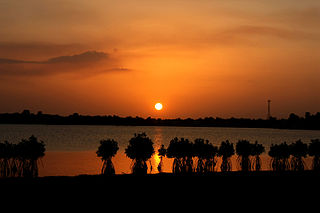
The Eastern Province is one of the nine provinces of Sri Lanka, the first level administrative division of the country. The provinces have existed since the 19th century but did not have any legal status until 1987 when the 13th Amendment to the Constitution of Sri Lanka established provincial councils. Between 1988 and 2006 the province was temporarily merged with the Northern Province to form the North Eastern Province. The capital of the province is Trincomalee. Kalmunai is the largest and most populous city of Eastern Province.
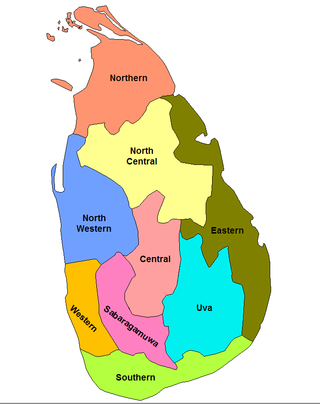
The Sri Lanka Eastern Provincial Council elections, 2008 was held on May 10, 2008 to elect members to Sri Lanka’s Eastern Provincial Council. Following the successful completion of local government elections in the Batticaloa District, Sri Lanka’s Elections Department announced on March 14 that the elections for the Eastern Provincial Council were to be held in May, after a lapse of 20 years. It was only the second time direct elections are held to select members for the council, and first time for the Eastern Provincial Council alone, after it was separated from the North-Eastern Provincial Council in 2006.
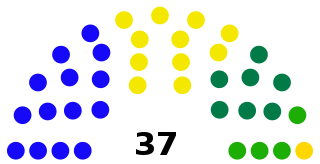
The Eastern Provincial Council is the provincial council for the Eastern Province in Sri Lanka. In accordance with the Sri Lankan constitution, EPC has legislative power over a variety of matters including agriculture, education, health, housing, local government, planning, road transport and social services. The constitution also gives it powers over police and land but successive central governments have refused to devolve these powers to the provinces. EPC has 37 members elected using the open list proportional representation system.
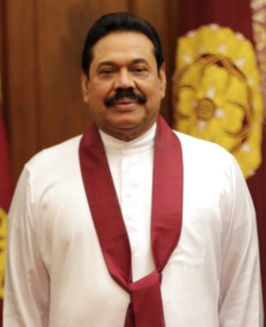
Sri Lanka has held several rounds of Provincial Council elections in 2008 and 2009 to elect members to eight of the country’s Provincial Councils. The decision to hold elections in different parts of the country on separate days was a break in the usual practice, which is to hold elections for the whole country on the same day. For each provincial council, members are elected to serve a five-year term. A chief minister for the province is chosen by the elected members.
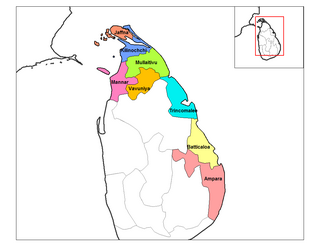
Provincial Council elections were held on 19 November 1988 to elect members to Sri Lanka’s North Eastern Provincial Council.

The Northern Province is one of the nine provinces of Sri Lanka. The province has an area of 8,884 km2, making it the 3rd largest province by area, and a population of 1,061,315, making it the least populated province. Jaffna is the capital city of the province.

The 2004 Sri Lankan provincial council election was held on 24 April 2004 and 10 July 2004 to elect members to seven provincial councils in Sri Lanka. No election was held in the eighth province, North Eastern, which had been governed directly by the national government since March 1990. The United People's Freedom Alliance, which was in power nationally, won all seven provinces.

Northern Provincial Council is the provincial council for the Northern Province in Sri Lanka. In accordance with the Sri Lankan constitution, NPC has legislative power over a variety of matters including agriculture, education, health, housing, local government, planning, road transport and social services. The constitution also gives it powers over police and land but successive central governments have refused to devolve these powers to the provinces. NPC has 38 members elected using the open list proportional representation system.
The 1999 Sri Lankan provincial council election was held on 25 January 1999, 6 April 1999 and 10 June 1999 to elect members to seven provincial councils in Sri Lanka. No election was held in the eighth province, North Eastern, which had been governed directly by the national government since March 1990. The People's Alliance, which was in power nationally, won the majority of seats in two provinces. It was also able to form a majority administration in the other five provinces with the support of smaller parties such as the Ceylon Workers' Congress.
The Eelam National Democratic Liberation Front (ENDLF) is a former Indian backed Tamil militant group in Sri Lanka. It was formed in 1987 as an amalgamation of splinter groups from other militant groups. It is currently a pro-government paramilitary group and political party. In August 2011 it was reported that the party is to be deregistered.
The Indian intervention in the Sri Lankan civil war was the deployment of the Indian Peace Keeping Force in Sri Lanka intended to perform a peacekeeping role. The deployment followed the Indo-Sri Lankan Accord between India and Sri Lanka of 1987 which was intended to end the Sri Lankan civil war between separatist Sri Lankan Tamil nationalists, principally the Liberation Tigers of Tamil Eelam (LTTE), and the Sri Lankan Military.

Provincial council elections were held in Sri Lanka on 8 September 2012 to elect 114 members to three of the nine provincial councils in the country. 3.3 million Sri Lankans were eligible to vote in the election. Elections for the Northern Provincial Council, which had been governed directly by the national government since it was demerged from the North Eastern Provincial Council in January 2007, are overdue but the government has not set a date. Elections to the remaining five provincial councils are not due till 2014 as they had their last election in 2009.
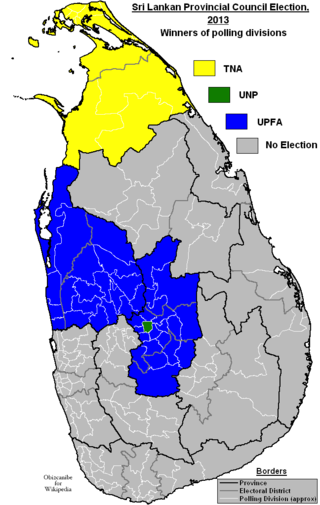
Provincial council elections were held in Sri Lanka on 21 September 2013 to elect 148 members to three of the nine provincial councils in the country. 4.4 million Sri Lankans were eligible to vote in the election. Elections to the remaining six provincial councils were not due as they had their last election in 2009 or 2012. This was the first provincial council election in the Northern Province in 25 years.
Annamalai Varadaraja Perumal is a politician from Sri Lanka. He was the 1st and only Chief minister of the North Eastern Province, Sri Lanka. He is the founder of Eelam People's Revolutionary Liberation Front.
Provincial governments of Sri Lanka are the devolved governments of the nine Provinces of Sri Lanka. In accordance with the Sri Lankan constitution, provinces have legislative power over a variety of matters including agriculture, education, health, housing, local government, planning, road transport and social services. The constitution also gives them powers over police and land but successive central governments have refused to devolve these powers to the provinces.
The Government of the Northern Province refers to the provincial government of the Northern Province of Sri Lanka. Under the Sri Lankan constitution the nine provincial governments of the country have power over a variety of matters including agriculture, education, health, housing, local government, planning, road transport and social services. The constitution also gives them powers over police and land but successive central governments have refused to devolve these powers to the provinces. Legislative power rests with the Northern Provincial Council whilst executive power rests with the Governor and Board of Ministers.
Provincial council elections were held in Sri Lanka on 29 March 2014 to elect 159 members to two of the nine provincial councils in the country. 5.9 million Sri Lankans were eligible to vote in the election. Elections to a third provincial council (Uva) were held on 20 September. Elections to the remaining six provincial councils were not due as they had their last election in 2012 or 2013.
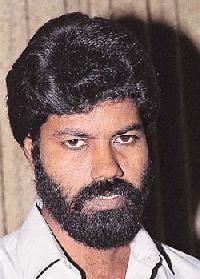
Kandasamy Pathmanabha was a Sri Lankan Tamil rebel and founder/leader of the Eelam People's Revolutionary Liberation Front (EPRLF), a separatist Tamil militant organisation in Sri Lanka.













